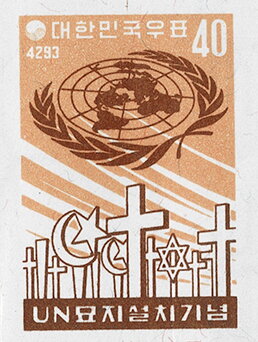Stamp: UN emblem and grave (Korea, South 1960)
UN emblem and grave (Korea, South 1960)
01 November (Korea, South ) within release Establishment of the UN Memorial Cemetery goes into circulation Stamp UN emblem and grave face value 40 South Korean hwan
| Stamp UN emblem and grave in catalogues | |
|---|---|
| Colnect codes: | Col: KR 1960.11.01-02a |
Stamp is square format.
Stamp from miniature sheetAlso in the issue Establishment of the UN Memorial Cemetery:
- Stamp - UN emblem and grave face value 40;
- Souvenir Sheet - UN emblem and grave face value 40;
- Stamp - UN emblem and grave face value 40;
|
Data entry completed
53%
|
|
|---|---|
| Stamp UN emblem and grave in digits | |
| Country: | Korea, South |
| Date: | 1960-11-01 |
| Perforation: | Imperforate |
| Emission: | Commemorative |
| Format: | Stamp |
| Face Value: | 40 South Korean hwan |
Stamp UN emblem and grave it reflects the thematic directions:
An anniversary is the date on which an event took place or an institution was founded in a previous year, and may also refer to the commemoration or celebration of that event. For example, the first event is the initial occurrence or, if planned, the inaugural of the event. One year later would be the first anniversary of that event. The word was first used for Catholic feasts to commemorate saints. Most countries celebrate national anniversaries, typically called national days. These could be the date of independence of the nation or the adoption of a new constitution or form of government. The important dates in a sitting monarch's reign may also be commemorated, an event often referred to as a "Jubilee".
A cemetery, burial ground, gravesite, graveyard, or a green space called a memorial park or memorial garden, is a place where the remains of many dead people are buried or otherwise entombed. The word cemetery (from Greek κοιμητήριον 'sleeping place')implies that the land is specifically designated as a burial ground and originally applied to the Roman catacombs. The term graveyard is often used interchangeably with cemetery, but a graveyard primarily refers to a burial ground within a churchyard.
A globe is a spherical model of Earth, of some other celestial body, or of the celestial sphere. Globes serve purposes similar to maps, but, unlike maps, they do not distort the surface that they portray except to scale it down. A model globe of Earth is called a terrestrial globe. A model globe of the celestial sphere is called a celestial globe
Logos is a term used in Western philosophy, psychology and rhetoric, as well as religion (notably Christianity); among its connotations is that of a rational form of discourse that relies on inductive and deductive reasoning.
Religion is any cultural system of designated behaviors and practices, world views, texts, sanctified places, ethics, or organizations, that relate humanity to the supernatural or transcendental. Religions relate humanity to what anthropologist Clifford Geertz has referred to as a cosmic "order of existence". Different religions may or may not contain various elements ranging from the "divine", "sacred things", "faith", a "supernatural being or supernatural beings" or "some sort of ultimacy and transcendence that will provide norms and power for the rest of life". Religious practices may include rituals, sermons, commemoration or veneration (of deities), sacrifices, festivals, feasts, trances, initiations, funerary services, matrimonial services, meditation, prayer, music, art, dance, public service, or other aspects of human culture. Religions have sacred histories and narratives, which may be preserved in sacred scriptures, and symbols and holy places, that aim mostly to give a meaning to life. Religions may contain symbolic stories, which are sometimes said by followers to be true, that have the side purpose of explaining the origin of life, the Universe and other things. Traditionally, faith, in addition to reason, has been considered a source of religious beliefs. There are an estimated 10,000 distinct religions worldwide. About 84% of the world's population is affiliated with one of the five largest religions, namely Christianity, Islam, Hinduism, Buddhism or forms of folk religion.




